Arts & Culture
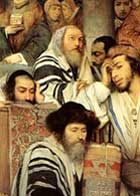 Let Us Pray
Let Us PrayFriday, January 22, 2010 | Jewish Ideas Daily » Daily Features
"Rabbi Shimon said: make not your prayers a fixity, but a plea." The inevitable tension in prayer between practice and passion, between communal structure and the lone voice, was certainly known to the biblical prophets and the rabbis of the Talmud. Yet today, the traditional prayers—profoundly communal and reflecting ancient ideas of monarchy, patriarchy, and retribution, sometimes in complicated Hebrew—seem alien to many. If the test of contemporary Judaism is whether it offers a compelling personal experience to "the Jew within," a common liturgy becomes more difficult to maintain than ever before. And so, the project of renewing the Siddur—the Hebrew...
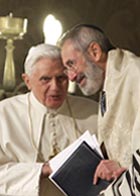 Dona Nobis Pacem
Dona Nobis PacemWednesday, January 20, 2010 | Jewish Ideas Daily » Daily Features
On Sunday, Pope Benedict XVI made his first visit to Rome's synagogue. Clouding the occasion was the feeling among many that the Vatican has yet to make an honest reckoning with its conduct in World War II, a failure epitomized in the process under way to beatify Pius XII. Despite a papal visit to Israel and meetings with Jewish leaders, Benedict has seemed surprisingly maladroit in his dealings with the Jewish community. More is at work here than manners. For the Pope, a serious philosopher and intellectual, the truths of faith and the truths of reason are mutually reinforcing gifts of...
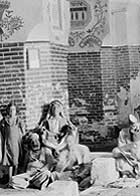 Ezekiel’s Tomb
Ezekiel’s TombTuesday, January 19, 2010 | Jewish Ideas Daily » Daily Features
Twenty-five centuries have passed since exiled Jews first wept for Zion by the waters of Babylon. Today only eight Jews are left in Iraq. Their story is not as well known as that of their European brethren, but in the Babylonian Talmud, for starters, Babylon-Iraq was home to the most influential post-biblical book in Jewish history. That it would become so was due to the Geonim, another extraordinary set of Iraqi rabbis who flourished in early Islamic times and whose most significant figure was Saadya ben Joseph (882/892–942). After the Middle Ages, creativity extended outward as well, with Iraqi Jews founding other...
 Let My People In
Let My People InThursday, January 14, 2010 | Jewish Ideas Daily » Daily Features
Debates over conversion to Judaism show no sign of abating, least of all in Israel. Last week, the legal adviser to the country's chief rabbinate declared that all conversions may retroactively be annulled at any time. In the ensuing firestorm of criticism, even some on the religious Right chimed in, especially those reflecting a historically more lenient Sephardi approach. A great deal of institutional politics is involved here, including between the ultra-Orthodox in Israel and the Modern Orthodox in the United States; some of this came to light in the recent disgrace and resignation of an ultra-Orthodox foe of the moderates....
 The Harshness of Creation
The Harshness of CreationLike the 2004 tsunami that devastated southeast Asia, yesterday's catastrophic earthquake in Haiti, a poverty-stricken country with a legacy of home-grown violence and suffering, inevitably provoked the terrible question: where was God? One answer derives from Jewish religious sources, and specifically from the teachings of the Kabbalah. It has to do with tzimtzum, or contraction: that is, God's own contraction and limitation of Himself in order to make space for the finite—and invariably flawed—worlds of physical nature and human action. The idea was most famously developed in Safed, Palestine by the 16th-century kabbalist Isaac Luria as part of a complicated, esoteric myth...
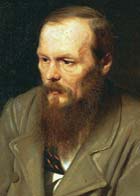 Was Dostoevsky a Scoundrel?
Was Dostoevsky a Scoundrel?The Russian novelist Fyodor Dostoevsky (1821–1881), rightly known as a peerless master of psychological fiction, a fierce anti-socialist polemicist, an anti-romantic with a pulsingly romantic commitment to prophetic religion, and a dramatist of moral ideas without compare since the English poet John Milton, also happened to harbor an ugly fixation on the Jews.
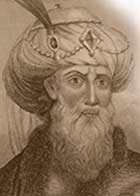 Jewish Wars, Then and Now
Jewish Wars, Then and NowMonday, January 11, 2010 | Jewish Ideas Daily » Daily Features
A masterwork of historical writing, The Jewish Wars by Yosef ben Matityahu, better known by his Roman name of Flavius Josephus (37–ca. 100 C.E.) is a massive and indispensable chronicle of Jewish fortunes from the Hasmonean Revolt in the second century B.C.E. through the destruction of the Temple and the fall of Masada in 73 C.E. It is also the autobiography of an extraordinary and extraordinarily conflicted man. Military leader, historian, biblical interpreter, negotiator, diplomat, neither martyr nor traitor but something in-between, Josephus traversed a route from battlefield commander in the war against Rome to Roman citizen and favored beneficiary of imperial...
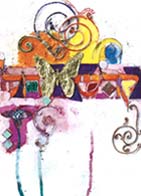 Art is a Camera
Art is a CameraFriday, January 8, 2010 | Jewish Ideas Daily » Daily Features
Ever since the Second Commandment, with its prohibition of "images," Judaism has been an un-, or even anti-visual culture. Or so we are told. While there is some truth to this notion, it is a very limited truth. The realities—historical, philosophical, above all aesthetic—are much more complicated and much more interesting. After all, the Bible itself tells us that at Sinai the people "saw the voices." Scholars have demonstrated the rich visual culture at work in Jewish history, as well as the role of the visual imagination in theology and mysticism—and in the daily experience of those for whom Judaism is...
 Who Can Retell?
Who Can Retell?Tuesday, December 15, 2009 | Jewish Ideas Daily » Daily Features
Among the holidays of the Jewish year, Hanukkah may surpass even Passover in the sheer number and variety of the songs devoted to recalling, retelling, and rejoicing in the events of the past and their evergreen message. For American Jews of a certain age nostalgic for their childhood, Diane Ashton deftly surveys the English-language ditties of the 1950’s, from “Who Can Retell” to “I Had a Little Dreydl” and beyond. Today’s casual consumers have their pick of dozens of new CD’s in English, Yinglish, and Hebrew, folk, rock, and heavy metal, many of them rivaling the Christmas market for kitsch. But...
Editors' Picks
The Belated Contender Adam Kirsch, Tablet. It's more than a little revealing that Nathan Englander's stories of identity and belief seem shallow and garish, while his story of Jewish politics feels challenging and true.
Treyf Adam Gregerman, Forward. Far from building a bridge between Jews and Christians, Shmuley Boteach's portrait of Jesus will be rejected by most Christians as irrelevant, ahistorical, and even insulting.
Blessed are the Bootleggers Allan Nadler, Tablet. While rabbis opposed Prohibition in the name of religious freedom, and many Jews embraced the black market, one Izzy Einstein became the most successful enforcer of dry laws in the country.
On the Hatred of Haredim Gil Troy, New Republic. Contrary to media hype, Israel is not becoming an ultra-Orthodox theocracy. Rather, the recent violence is a reaction to increasing integration, and a symptom of the Haredi leadership losing its grip.
Whitewashing Black-Jewish History Sivan Zakai, jweekly. Both African-Americans and Jews journeyed from slavery to redemption, ultimately united as allies in the civil rights era. It makes for an appropriate and inspiring school lesson. But is it good history?
Mincing Words Philologos, Forward. The Yiddish expression makhn ash un blote—"to make ashes and mud" or "to make mincemeat" of someone—exemplifies the influence of biblical idiom on Yiddish phraseology.
Creaming the Competition Elli Fischer, Jerusalem Post. Ruling Haagen Dazs ice cream to be non-kosher, the Israeli chief rabbinate misconstrues Moshe Feinstein's position and once again demonstrates its contempt for Diaspora Judaism.
Auster and Erdogan on Human Rights in Turkey Dave Itzkoff, New York Times. The Turkish Prime Minister called the novelist ignorant for refusing to visit Turkey because of all those journalists in Turkish jails. Auster has delivered quite an answer.
Should We Worry about Adelson? Ira Sharkansky, Jerusalem Post. Sheldon Adelson almost single-handedly kept Newt Gingrich's candidacy alive. Maybe that's bad for the Jews—or maybe Adelson is just providing some ideological balance to George Soros.
Blurring the Issue Hadassah Levy, Torah Musings. Blurring or removing photographs of women might be understandable in the ultra-Orthodox world, but it should have no place in Modern Orthodoxy.

